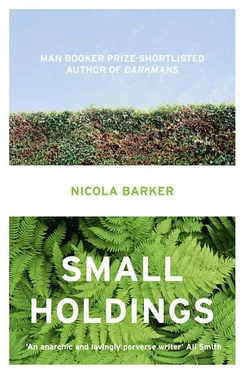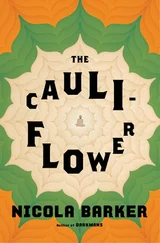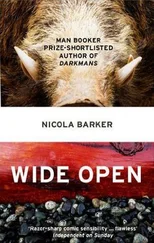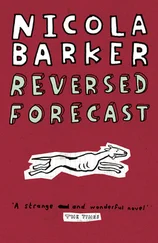I stared at her blankly. She stood up. ‘Finish your kidneys,’ she said, and then she picked up her stick and left me.
I RAN A WARM BATH and soaked every bit of me in it. I stuck my head underwater and breathed the water in through my nose, swallowed some of it, blew the rest of it out, full of soil and muck and flaking red residue.
After the bath I had hoped to feel bolder, but I didn’t. I looked in the mirror and saw the same hairy, scared creature staring straight back at me.
In my bedroom I pulled on a clean shirt and some trousers. I pulled out my suit too, my funeral suit, from the back of the wardrobe, and laid it flat across the bed. My funeral suit. Whose funeral? I put the suit away again.
Still on the pillow lay Dr John Sledge’s I’m Not Angry, I’m Hurting. I picked it up. I opened it. At the top of the page was a heading in bold lettering. It said: WHAT HAVE YOU GOT TO LOSE?
Everything or nothing? Think about it for a moment. Give this question some serious thought, and once you have thought about it, think about this:
(1) If you’ve got A LOT to lose, then why take the risk of losing it? If you’ve got A LOT to lose then you’ve got something worth fighting for.
(2) If you’ve got NOTHING to lose, then why delay? Act today. What possible harm could it do you? Things can only get better. You’ve got NOTHING to lose and everything to gain.
Repeat after me, out loud, ‘I’ve got nothing to fear but fear itself.’ Again, ‘I’ve got nothing to fear but fear itself.’ Feeling better? Well done. Why am I congratulating you? I’ll tell you why. I’m congratulating you because you are on the road to healing yourself. It’s a wonderful journey. Come, travel with me.
I shut the book, turned it over and stared at the photograph of Dr John Sledge on the back of it. Dr Sledge was younger than I imagined. He had a head like a pumpkin. He exuded a kind of ghastly, glistening rude health. He had a mole in between his nose and his top lip. He was smiling broadly and he had perfect teeth. Out loud I said it. ‘Dr Sledge,’ I said, ‘if you came and sat down next to me on a train I’d change compartments.’
I brewed some coffee. I ate three pieces of bread and butter. While I ate I considered the things I had yet to do. Some strimming by the rose garden, the hydrangeas needed cutting back. I’d noticed some of the rubbish bins by the tennis courts were full. What else? Nothing else.
I searched for my keys, found them, picked up a jumper from the back of a chair because the air outside had turned nippy. As I picked up the jumper I knocked the files which Saleem had balanced precariously on the edge of the kitchen table. I swore. The top one fell and the bottom one followed. Their paper guts scattered across the floor. And as I picked up each sheet I told myself: See this? All this writing and planning and calculating? This is the business, this stuff. The park, well that’s something altogether different. They are two different entities. Altogether separate.
But the paper was covered in Doug’s close hand. Doug’s figures and letters. I couldn’t help but see Doug in these papers. I picked them up. Some had doodles on them, inkspots, drops of tea, bits of crumb. Some were crumpled, others pristine. Some were stuck together. I tried to pull these apart as a tribute to Doug and then there, before me, the most incredible thing happened.
The paper unfolded. Several sheets had been stuck together with Sellotape, hinged together on purpose. I unfolded, one piece and two pieces, three pieces, four, and beheld the most perfect, most detailed, accurate and lovely sketch, in green and red pen — mad colours — of the park: all its parts, but something new, too.
In gorgeous detail, a little maze. A magical thing. A heart-shaped maze with a waterfall at its centre. Ornate statues in dead ends, occasional arches and trellises, and honeysuckle. Spy-glasses and sunflowers and poppies growing through the privet. Concrete frogs peeping out from corners and pheasants stalking with glass tails.
And at last, I saw Doug. I saw Doug. My hands started shaking, my eyes filled, because at last I saw Doug. He was right there in front of me. He was not lost any more.
I FORGOT ABOUT ALL those other tasks. Instead I stared at Doug’s plans for what seemed like an eternity. Of course he’s mad, I told myself. Of course he is. And when I told myself that Doug was mad it sounded in my ears like the grandest kind of compliment, an accolade, the sweetest benediction.
Once I’d familiarized myself thoroughly with every detail of Doug’s crazy plan, I read through the other stuff too. I put the receipts into some semblance of order, I calculated how much we’d spent over the last year and on what, and how much we’d saved by frugal management. I tried to work out whether we could claim for the damage to the greenhouse under our present system of insurance. And then I went out.
I went out and I walked for a very long time. Things needed sorting and I wasn’t entirely sure who was going to sort them. Was I going to sort them? Could I?
I walked for a very long time and eventually I found myself in Southgate and I was outside an all-night chemist and then I was inside and standing by the counter.
‘Can I help you?’ He was a young man with ginger hair and brown eyes. He wore a white lab coat and glasses. I said, ‘I want a packet of condoms please. Extra small.’
Slightly surprised, he pointed to my left. ‘Over there, on the counter. We have several varieties. All sizes.’
I said, ‘Only sometimes it’s hard to find the extra small ones because. . they’re extra small.’ My face was a fire engine.
‘I’ll help you look, shall I, sir?’
Cool, calm, collected. Breathe one, breathe two, breathe three. ‘That’s kind of you. Thanks.’
My voice was going. I sounded Scottish, to myself; vowels crawling out from all corners of my mouth like crabs.
He rummaged for a while and produced three different packets.
‘Three types. An y preference?’
‘Any. All. I’ll take all three. Thank you.’
‘I’ll pop them in a bag for you, shall I, sir?’
‘Grand. Thanks.’
‘There we go.’
‘Thanks. Very much.’
You see, the problem is a very simple one, really. It’s all a question of wanting — not just wanting, but needing, like something categorical. Needing to be a part of a landscape. It’s about belonging to a place and wanting to belong and not knowing whether other people will even let you get around to feeling like you belong.
It’s more than that, more even than that. It’s like wanting to be an actual, a physical part of the landscape.
Animals do it. A bird belongs to the sky and the trees just as much as the trees and the sky themselves belong. No one questions — no one thinks to question — whether the worm a bird plucks from the soil is rightfully his. How could a berry belong anywhere else but in a starling’s gut? No one doubts it.
But people. Where do we fit in? How can we fit in? How do we know that we fit and who can we ask? And some people will always feel like they fit and try to make others feel like they don’t. And others won’t ever fit or feel like they fit, will never, ever feel that way.
All these thoughts, every single one of them, were my technique for avoiding stuff that was happening, that would happen. And I wouldn’t stop it. I couldn’t stop it.
I’d asked for the condoms, hadn’t I? Saleem was right. Maybe the only way to stop being embarrassed was to no longer avoid it. To search it out, to try — even — to enjoy it. To embrace it.
I walked for a very long time and then I got on a bus and ended u p in Enfield outside an all-night chemist. And then I was inside the chemist and I was telling the assistant — a small, dark woman with a silver moustache — I’ve got crabs. Do you have anything for crabs? Are there many different varieties of crab? What are mine like? I don’t know. Little ginger things, tiny things.
Читать дальше
Конец ознакомительного отрывка
Купить книгу












